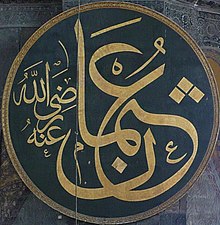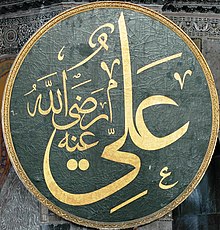User:GOLDIEM J/sandbox
Appearance
Rashidun[edit]
Abu Bakr[edit]
| Abu Bakr أَبُو بَكْرٍ | |||||
|---|---|---|---|---|---|
 Calligraphic seal featuring Abu Bakr's name, on display in the Hagia Sophia | |||||
| 1st Caliph of the Rashidun Caliphate | |||||
| Reign | 8 June 632 – 23 August 634 | ||||
| Predecessor | Position established | ||||
| Successor | Umar ibn al-Khattab | ||||
| Born | 27 October 573 Mecca, Hejaz, Arabia (present-day Saudi Arabia) | ||||
| Died | 23 August 634 (aged 60) Medina, Hejaz, Rashidun Caliphate (present-day Saudi Arabia) | ||||
| Burial | Al-Masjid an-Nabawi, Medina | ||||
| Spouse | Qutaylah[c] Umm Ruman Asma bint Umais Habibah bint Kharijah | ||||
| Issue | Asma Abd al-Rahman Abd Allah Aisha Muhammad Umm Kulthum | ||||
| |||||
| Father | Abu Quhafa | ||||
| Mother | Umm al-Khayr | ||||
| Brothers | |||||
| Sisters |
| ||||
| Tribe | Quraysh (Banu Taym) | ||||
| Religion | Islam | ||||
| Occupation | Businessman, public administrator, economist | ||||
Officeholder[edit]
Umar[edit]
| ‘Umar عمر | |
|---|---|
 Calligraphic seal featuring Umar's name, on display in the Hagia Sophia | |
| 2nd Caliph of the Rashidun Caliphate | |
| Reign | 23 August 634 – 3 November 644 |
| Predecessor | Abu Bakr |
| Successor | Uthman |
| Born | c. 582 or 583 CE Mecca, Hejaz, Arabia (present-day KSA) |
| Died | c. November 644 CE
(Dhu al-Hijjah 23 or Muharram 24 AH) (aged 60–61) Medina, Hejaz, Rashidun Caliphate (present-day KSA) |
| Burial | Prophet's Mosque, Medina |
| Spouse | |
| Issue (among others) | |
| Tribe | Quraysh (Banu Adi) |
| Father | Al-Khattab ibn Nufayl |
| Mother | Hantamah bint Hisham |
| Religion | Islam |
| Signature | |
| Arabic name | |
| Personal (Ism) | ʿUmar |
| Patronymic (Nasab) | ʿUmar ibn al-Khaṭṭāb ibn Nufayl ibn ʿAbd al-ʿUzzā ibn Rāz ibn ʿAdiyy ibn Kaʿab ibn Luʿayy ibn Ghālib ibn Fihr ibn Mālik |
| Teknonymic (Kunya) | Abul Hafs |
| Epithet (Laqab) | Al-Fārūq ("the distinguisher (between right and wrong)") |
Officeholder[edit]
Uthman[edit]
| Uthman عثمان | |
|---|---|
| |
 Calligraphic seal featuring Uthman's name, on display in the Hagia Sophia | |
| 3rd Caliph of the Rashidun Caliphate | |
| Reign | 6 November 644 – 17 June 656 |
| Predecessor | Umar ibn Al-Khattab |
| Successor | Ali ibn Abi Talib |
| Born | c. 573 or 576 (46 BH) Taif, Hejaz, Arabia (present-day KSA) |
| Died | 17 June 656 (aged 80–83) (12[4][5]/18 Dhu al-Hijjah 35 AH)[6][7] Medina, Hejaz, Rashidun Caliphate (present-day KSA) |
| Burial | Jannat al-Baqi, Medina |
| Spouse |
|
| Issue (among others) | |
| Tribe | Quraysh (Banu Umayya) |
| Father | Affan ibn Abi al-'As |
| Mother | Arwa bint Kurayz |
| Religion | Islam[8] |
Officeholder[edit]
Ali[edit]
| Ali عَلِيّ | |||||
|---|---|---|---|---|---|
 Calligraphic pan bearing Ali's name at the Hagia Sophia | |||||
| 4th Caliph of the Rashidun Caliphate | |||||
| Reign | 656–661[9] | ||||
| Predecessor | Uthman ibn Affan | ||||
| Successor | Abolished position Hasan ibn Ali (as caliph) | ||||
| 1st Shia Imam | |||||
| Tenure | 632–661 | ||||
| Predecessor | Established position | ||||
| Successor | Hasan ibn Ali | ||||
| Born | c. 600 CE Mecca, Hejaz, Arabia (present-day KSA) | ||||
| Died | c. 28 January 661 (c. 21 Ramadan AH 40) (aged c. 60) Kufa, Rashidun Caliphate (present-day Iraq) | ||||
| Burial | |||||
| Spouse |
| ||||
| Issue | |||||
| |||||
| Tribe | Quraysh (Banu Hashim) | ||||
| Father | Abu Talib ibn Abd al-Muttalib | ||||
| Mother | Fatimah bint Asad | ||||
| Religion | Islam | ||||
| Signature |  | ||||
| Arabic name | |||||
| Personal (Ism) | Ali | ||||
| Patronymic (Nasab) | Ali ibn Abu Talib ibn Abd al-Muttalib ibn Hashim ibn Abd Manaf ibn Qusai ibn Kilab | ||||
| Teknonymic (Kunya) | Abu al-Hasan[q][9] | ||||
| Epithet (Laqab) | Abu Turab[r][9] | ||||
Officeholder[edit]
Iraq infobox[edit]
GOLDIEM J/sandbox | |
|---|---|
| Establishment history | |
| 3 October 1932 | |
| 14 July 1958 | |
| 15 October 2005 | |
- ^ İsmet Uzun, Mustafa (2013). "YÂR-ı GĀR (Companion of the cave)". TDV Encyclopedia of Islam (in Turkish).
- ^ Majlisi, Muhammad Baqir. Mir'at ul-Oqool. Vol. 21. p. 199.
- ^ Al-Tusi, Nasir Al-Din. Al-Mabsoot. Vol. 4. p. 272.
- ^ Musannaf Ibn Abi Shaybah vol. 13, pg 388, no. 38727, status of naration: Sahih.
- ^ Muhammad, Muhammad Hamid (7 May 2018). سيرة ومناقب عثمان بن عفان. Dar al-Taqwa. ISBN 9789776603585.
استشهد في أوسط أيام التشريق (12 ذي الحجة) لصحة نقله عن أبي عثمان النهدي، المعاصر للحادثة. وما سواه من أقوال لم يصح إسناد شيء منها، وكل ما جاء به من أسانيد فهي ضعيفة، وبعض منها صدر ممن لم يعاصر الحادثة. [He was martyred in the middle of the days of Tashreeq, because it was reported by Abu Uthman Al-Nahdi, a contemporary of the incident. As for other sayings, none of them are authentic, and all the chain of narrators that scholars brought are weak, and some of them were issued by those who did not contemporary with the incident.]
- ^ [R. Stephen Humphreys (transl.), The History of al-Tabari: Volume XV. The Crisis of the Early Caliphate, (New York: State University of New York Press, 1990), pp. 250-251.]
- ^ Wilferd Madelung, The Succession to Muhammad: A Study of the Early Caliphate (Cambridge: Cambridge University Press, 1997), p. 135.
- ^ "Uthman ibn Affan | Biography, Achievements, & Assassination". 13 June 2023.
- ^ a b c d e f g h i j k Nasr & Afsaruddin 2022.
- ^ Öz 1989, pp. 392–393.
.[edit]
Cite error: There are <ref group=lower-alpha> tags or {{efn}} templates on this page, but the references will not show without a {{reflist|group=lower-alpha}} template or {{notelist}} template (see the help page).
